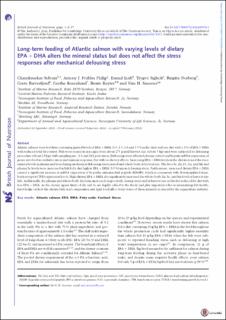| dc.contributor.author | Selvam, Chandrasekar | |
| dc.contributor.author | Prabhu, P. Antony Jesu | |
| dc.contributor.author | Lutfi Royo, Esmail | |
| dc.contributor.author | Sigholt, Trygve | |
| dc.contributor.author | Norberg, Birgitta | |
| dc.contributor.author | Bæverfjord, Grete | |
| dc.contributor.author | Rosenlund, Grethe | |
| dc.contributor.author | Ruyter, Bente Synnøve | |
| dc.contributor.author | Sissener, Nini | |
| dc.date.accessioned | 2022-09-20T08:14:37Z | |
| dc.date.available | 2022-09-20T08:14:37Z | |
| dc.date.created | 2022-05-23T13:17:47Z | |
| dc.date.issued | 2022 | |
| dc.identifier.citation | British Journal of Nutrition. 2022, . | en_US |
| dc.identifier.issn | 0007-1145 | |
| dc.identifier.uri | https://hdl.handle.net/11250/3019043 | |
| dc.description.abstract | Atlantic salmon were fed diets containing graded levels of EPA + DHA (1·0, 1·3, 1·6 and 3·5 % in the diet) and one diet with 1·3 % of EPA + DHA with reduced total fat content. Fish were reared in sea cages from about 275 g until harvest size (about 5 kg) and were subjected to delousing procedure (about 2·5 kg), with sampling pre-, 1 h and 24 h post-stress. Delousing stress affected plasma cortisol and hepatic mRNA expression of genes involved in oxidative stress and immune response, but with no dietary effects. Increasing EPA + DHA levels in the diet increased the trace mineral levels in plasma and liver during mechanical delousing stress period and whole body at harvest size. The liver Se, Zn, Fe, Cu, and Mn and plasma Se levels were increased in fish fed a diet high in EPA + DHA (3·5 %) upon delousing stress. Furthermore, increased dietary EPA + DHA caused a significant increase in mRNA expression of hepcidin antimicrobial peptide (HAMP), which is concurrent with downregulated transferrin receptor (TFR) expression levels. High dietary EPA + DHA also significantly increased the whole-body Zn, Se, and Mn levels at harvest size fish. Additionally, the plasma and whole-body Zn status increased, respectively, during stress and at harvest size in fish fed reduced-fat diet with less EPA + DHA. As the dietary upper limits of Zn and Se are legally added to the feeds and play important roles in maintaining fish health, knowledge on how the dietary fatty acid composition and lipid level affect body stores of these minerals is crucial for the aquaculture industry. | en_US |
| dc.language.iso | eng | en_US |
| dc.title | Long-term feeding of Atlantic salmon with varying levels of dietary EPA+DHA alters the mineral status, but does not affect the stress responses after mechanical delousing stress | en_US |
| dc.title.alternative | Long-term feeding of Atlantic salmon with varying levels of dietary EPA+DHA alters the mineral status, but does not affect the stress responses after mechanical delousing stress | en_US |
| dc.type | Peer reviewed | en_US |
| dc.type | Journal article | en_US |
| dc.description.version | publishedVersion | en_US |
| dc.source.pagenumber | 17 | en_US |
| dc.source.journal | British Journal of Nutrition | en_US |
| dc.identifier.doi | 10.1017/S0007114522000514 | |
| dc.identifier.cristin | 2026532 | |
| dc.relation.project | Norges forskningsråd: 273215 | en_US |
| dc.relation.project | Fiskeri- og havbruksnæringens forskningsfinansiering: 901282 | en_US |
| cristin.ispublished | true | |
| cristin.fulltext | original | |
| cristin.qualitycode | 2 | |
